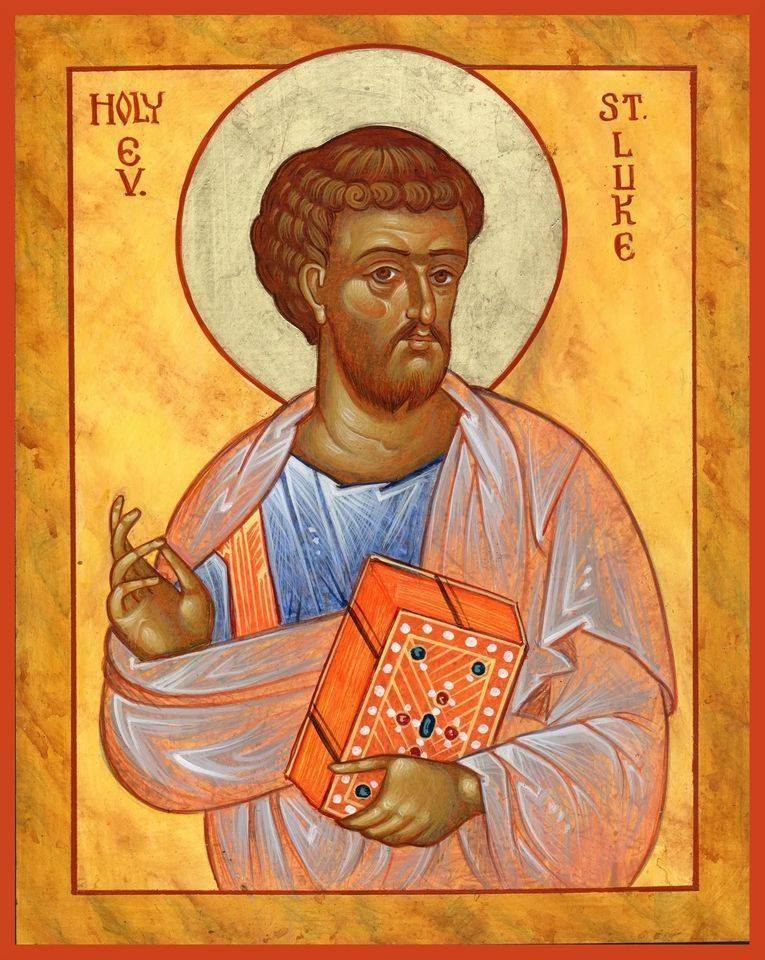
A blessed and glorious Feast of the Holy Apostle, Evangelist, Physician, and Iconographer Luke, to all celebrating today; a happy patronal day to all bearing his name.
(Icon of St Luke by the hand of Michael Kapeluck, Carnegie, PA)

A blessed and glorious Feast of the Holy Apostle, Evangelist, Physician, and Iconographer Luke, to all celebrating today; a happy patronal day to all bearing his name.
(Icon of St Luke by the hand of Michael Kapeluck, Carnegie, PA)
Keep your eyes fixed on Jesus Christ, love him tenderly and seek always better to understand the meaning of a God who died on the Cross for the salvation of souls.

Today, 5 October, is the liturgical memorial of a former satanist priest revert Catholic and promoter of the Rosary. Today our reflection and call to deeper faith has us meditating on the life and work of Blessed Bartolo Longo (1841-1926), who according to Pope John Paul II, the “Apostle of the Rosary.” The witness of Longo is one that is personal in two ways: my baptismal parish is Our Lady of Pompeii where the Rosary has been prayed fervently for years, and in mid-October I’ll be invested in the Order of the Holy Sepulchre, a group to which Blessed Bartolo also belonged. The parish the image and relic of Blessed Bartolo hangs in quite guidance of those who pass by. While I have a strong connection with the Order of Preachers, Longo was a professed member of the Third Order Laity, now known as the Fraternity of St Dominic. The Lay Dominican vocation gave certain direction to Longo which formed his heart and mind anew dedicating himself to Truth, Beauty and Goodness.
A brief biography of Blessed Bartolo Longo can be read here.
This prayer are caught under the bondage of Satanism and the occult:
“O Blessed Rosary of Mary, sweet chain that unites us to God, bond of love that unites us to the angels, tower of salvation against the assaults of Hell, safe port in our universal shipwreck, we will never abandon you. You will be our comfort in the hour of death: yours our final kiss as life ebbs away. And the last word from our lips will be your sweet name, O Queen of the Rosary of Pompei, O dearest Mother, O Refuge of Sinners, O Sovereign Consoler of the Afflicted. May you be everywhere blessed, today and always, on earth and in heaven.”
A little known blessed of the Church is the monk, Blessed Hermann of Reichenau, known also as Hermann the Cripple. He was an 11th century Benedictine monk who is said to be a genius, a polymath, and who needed help moving his body. From his hagiographers we learn of a quite a remarkable person. While the person of Hermann is not well-known yet is best remembered for being the composer of hymns. Two notable hymns are his Salve Regina and Alma Redemptoris Mater. Brother Hermann’s vocation was not his intellectual abilities but his call to the monastic way of life taking vows in 1043. It is said that he was entrusted by his parents to the learned Abbot Berno, at the age of seven, at the Benedictine abbey on Reichenau Island on the lake of Constance.
A few thoughts on Blessed Hermann can be read here.
The cult of Hermann was officially approved by the Holy See in 1863.
Beate Hermanne, ora pro nobis!

Today we celebrate the liturgical memory of the early twentieth century saint, Silouan the Athonite (+1938). For many Christians, East and West in the North America St. Silouan is an unknown personage but he is worth knowing as one his biographers writes he has “a sense of cosmic unity and the way that we are called to love and have compassion on all things:
He who has the Holy Spirit in him, to however slight a degree, sorrows day and night for all mankind. His heart is filled with pity for all God’s creatures…For them, more than himself, he prays day and night, that all may repent and know the Lord” (352).The Lord bestows such rich grace on His chosen that they embrace the whole earth, the whole world, with that love (367).
Once I needlessly killed a fly. the poor thing crawled on the ground, hurt and mangled, and for three whole days I wept over my cruelty to a living creature, and to this day the incident remains in my memory….One day, going from the Monastery to Old Russikon-on-the- Hill, I saw a dead snake on my path which had been chopped in pieces, and each piece writhed convulsively, and I was filled with pity for every living creature, every suffering thing in creation, and I wept bitterly before God (469).That green leaf on the tree which you needlessly plucked – it was not wrong, only rather a pity for the little leaf. The heart that has learned to love feels sorry for every created thing (376).The Spirit of God teaches the soul to love every living thing so that she would have no harm come to even a green leaf on a tree, or trample underfoot a flower of the field. Thus the Spirit of God teaches love towards all, and the soul feels compassion for every being (469).
Great news!
The current issue of Marian Helper has an article on the beatification process for the five martyrs belonging to the Marians of the Immaculate Conception, including Servant of God Fabian Abrantowicz, Servant of God Andrew Cikoto, and Servant of God Vladislovas Mažonas, all three who ministered in the Russian Catholic Apostolic Exarchate of Harbin.
They are known officially as “Servant of God Fabian and Four Companions, Martyrs”. The Circular Letter:
A few weeks ago two of the nuns at the Abbey of St. Walburga in Virginia Dale, CO, professed solemn vows. Terrific news to receive in this era. This abbey is among a few in the USA where traditional monasticism exists (and I am not referring to the praying of the TLM): community life, obedience, praying the Divine Office in common, the habit and work.
Read the story coming from the Denver Catholic newspaper.
Sermon on the Nativity of the Mother of God
Fr. Alexander Schmemann
The Church’s veneration of Mary has always been rooted in her obedience to God, her willing choice to accept a humanly impossible calling. The Orthodox Church has always emphasized Mary’s connection to humanity and delighted in her as the best, purest, most sublime fruition of human history and of man’s quest for God, for ultimate meaning, for ultimate content of human life.
If in Western Christianity veneration of Mary was centered upon her perpetual virginity, the heart of Orthodox Christian East’s devotion, contemplation, and joyful delight has always been her Motherhood, her flesh and blood connection to Jesus Christ. The East rejoices that the human role in the divine plan is pivotal. The Son of God comes to earth, appears in order to redeem the world, He becomes human to incorporate man into His divine vocation, but humanity takes part in this.
If it is understood that Christ’s “co-nature” with us is as a human being and not some phantom or bodiless apparition, that He is one of us and forever united to us through His humanity, then devotion to Mary also becomes understandable, for she is the one who gave Him His human nature, His flesh and blood. She is the one through whom Christ can always call Himself “The Son of Man.” Son of God, Son of Man… God descending and becoming man so that man could become divine, could become partaker of the divine nature (2 Peter 1:4), or as the teachers of Church expressed it, “deified.” Precisely here, in this extraordinary revelation of man’s authentic nature and calling, is the source that gratitude and tenderness which cherishes Mary as our link to Christ and, in Him, to God. And nowhere is this reflected more clearly that in the Nativity of the Mother of God. Nothing about this event is mentioned anywhere in the Holy Scriptures. But why should there be? Is there anything remarkable, anything especially unique about the normal birth of a child, a birth like any other?
The Church began to commemorate the event with a special feast… because, on the contrary, the very fact that it is routine discloses something fresh and radiant about everything we call routine and ordinary, it gives new depth to the unremarkable details of human life… And with each birth the world is itself in some sense created anew and given as a gift to this new human being to be his life, his path, his creation.This feast therefore is first a general celebration of Man’s birth, and we no longer remember the anguish, as the Gospel says, “for joy that a human being is born into the world” (Jn. 16:21). Secondly, we now know whose particular birth, whose coming we celebrate: Mary’s. We know the uniqueness, the beauty, the grace of precisely this child, her destiny, her meaning for us and for the whole world. And thirdly, we celebrate all who prepared the way for Mary, who contributed to her inheritance of grace and beauty…
And therefore the Feast of her Nativity is also a celebration of human history, a celebration of faith in man, a celebration of man.Sadly, the inheritance of evil is far more visible and better known. There is so much evil around us that this faith in man, in his freedom, in the possibility of handing down a radiant inheritance of goodness has almost evaporated and been replaced by cynicism and suspicion. This hostile cynicism and discouraging suspicion are precisely what seduce us to distance ourselves from the Church when it celebrates with such joy and faith this birth of a little girl in whom are concentrated all the goodness, spiritual beauty, harmony and perfection that are elements of genuine human nature. Thus, in celebrating Mary’s birth we find ourselves already on the road to Bethlehem, moving toward the joyful mystery of Mary as the Mother to God.

Today we had our agriculture blessed by Father Greg Lozinskyy, the pastor of St John the Baptist Byzantine Catholic Church (Trumbull, CT). Father Greg is a priest of the Ruthenian Eparchy of Passiac (NJ). He happily walked the land to bless us!
Typically I have the various parts of our agriculture project blessed earlier in the season but for many reasons that was impossible to plan. The great summer liturgical feast of the Transfiguration of our Lord is a fitting time in the Slavic Byzantine tradition to bless honey, so we blessed the newly made honey plus we invoked the Lord’s blessing upon the honey bees, pigs, cows, dogs, laying hens, and the land. Also, we asked the Lord to repel the pests.
The Byzantine Catholic Church (the same as the Orthodox and traditional Latin Churches) has a rich set of prayers for imploring God’s blessings on agriculture especially noting fruitfulness (i.e., generativity). We have successively “restored” the use of blessing of agriculture these last several years.
In the August edition of The Current, Blake Billings an Oblate of Portsmouth Abbey and faculty member of the School, wrote a terrific piece on the Servant of God Dorothy Day in light of her own oblation to the Benedictine charism.
I have been waiting for someone to take the time to curate the information on the role of the Benedictine charism in the life and work of Dorothy Day and Peter Maurin. As persons with human and spiritual desires we need an organizing principle to root the heart, to situate our intellect, and to focus our energies for the better, for the good, for joy. That’s whatthe Benedictine way of life gives to those who adhere to the Gospel of Jesus Christ, the magisterium, and the Rule of St Benedict. I was elated that Blake Billings did what I was looking for…perhaps the essay would be useful to you.
Take some time to read “Revisiting Dorothy Day“: